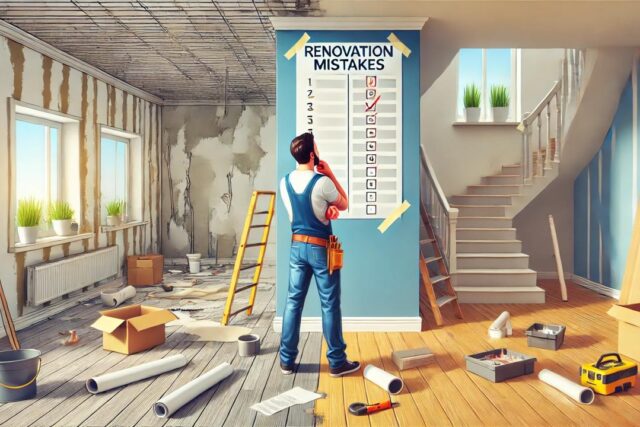
Home renovations can transform your living space, increase property value, and improve functionality. When planning a renovation, homeowners often face a critical decision: should they take the DIY route or hire experts? While some tasks are manageable as DIY projects, others require the expertise of hiring professionals to ensure quality and safety.
This article explores the pros and cons of DIY home renovations, safety considerations for DIY home projects, and how to choose the right contractor for your renovation so you can make an informed decision for your next home improvement project.
Pros and Cons of DIY Home Renovations
DIY home renovations can be rewarding, cost-effective, and provide a sense of accomplishment. However, they also come with challenges that may affect the outcome of your project. Here are the key advantages and disadvantages:
Pros of DIY Renovations
- Cost Savings – One of the biggest benefits of DIY is avoiding labor costs associated with hiring professionals.
- Flexibility – You can work at your own pace and schedule renovations based on your availability.
- Learning Opportunity – DIY projects allow homeowners to develop new skills and gain hands-on experience.
- Personal Satisfaction – Completing a project yourself can provide a sense of pride and accomplishment.
Cons of DIY Renovations
- Lack of Expertise – Mistakes can lead to costly repairs, making DIY work more expensive in the long run.
- Time-Consuming – DIY renovations often take longer than professional work due to skill limitations.
- Safety Risks – Handling electrical work, plumbing, or structural changes without proper training can be hazardous.
- Lower Quality Results – Without the right tools and experience, achieving professional-grade results can be challenging.
Safety Considerations for DIY Home Projects
If you decide to take the DIY route, prioritizing safety is crucial. Renovation projects often involve heavy materials, power tools, and hazardous substances, making safety awareness essential. Here are some important safety considerations for DIY home projects:
1. Use Proper Safety Gear
Always wear protective equipment, including gloves, goggles, ear protection, and masks, to reduce the risk of injuries.
2. Know Your Limits
Attempting electrical work, gas line installations, or major structural changes without expertise can be dangerous. Hiring professionals for complex tasks is often the safer choice.
3. Follow Instructions and Guidelines
Whether using power tools, handling chemicals, or installing materials, always read and follow manufacturer instructions to avoid accidents.
4. Keep Your Workspace Clean and Organized
A clutter-free workspace minimizes the risk of tripping, falling, or damaging materials during renovations.
5. Ensure Proper Ventilation
If painting, sanding, or working with chemicals, maintain good ventilation to prevent inhaling toxic fumes.
When to Hire Professionals for Home Renovations
While DIY projects can save money, there are times when hiring professionals is the best course of action. Certain renovations require specialized skills, permits, and compliance with building codes. Here’s when you should consider professional assistance:
1. Structural Changes and Major Remodels
Knocking down walls, adding rooms, or modifying a home’s foundation requires architectural planning and professional expertise to ensure safety and compliance.
2. Electrical and Plumbing Work
Dealing with electrical wiring or plumbing systems incorrectly can lead to hazards such as fires, water damage, or leaks. A licensed electrician or plumber ensures safety and compliance.
3. Roofing Repairs and Installations
Roofing projects involve working at heights, which increases the risk of falls and injuries. Professionals have the right equipment to complete roofing jobs safely.
4. HVAC Installations and Repairs
Heating, ventilation, and air conditioning (HVAC) systems require specialized knowledge. Improper installation can lead to inefficient performance and higher energy bills.
5. Custom Carpentry and High-End Finishes
For custom-built cabinetry, intricate woodwork, or high-end finishes, professional craftsmanship ensures a polished, long-lasting result.
How to Choose the Right Contractor for Your Renovation
If you decide to hire experts, selecting the right contractor is key to ensuring a smooth renovation experience. Follow these steps to find a reliable professional:
1. Define Your Project Scope
Before reaching out to contractors, outline the details of your renovation, including budget, timeline, and specific requirements.
2. Check Credentials and Licensing
Ensure the contractor is licensed, insured, and certified for the type of work they will be performing.
3. Read Reviews and Ask for References
Look for online reviews and ask for references from previous clients to assess the contractor’s reputation and quality of work.
4. Get Multiple Quotes
Obtain estimates from at least three contractors to compare pricing, services, and timelines. Be cautious of unusually low quotes, as they may indicate subpar workmanship.
5. Review the Contract Thoroughly
Before signing any agreement, carefully review the contract, ensuring it includes a detailed scope of work, payment schedule, and warranty terms.
Balancing DIY and Professional Help
For many homeowners, the best approach is a combination of DIY and professional assistance. Tackling minor cosmetic updates, such as painting walls, installing shelves, or assembling furniture, can be done independently. However, for major renovations involving structural work, plumbing, hiring professionals ensures safety, efficiency, and long-term durability.
Tips for a Balanced Approach:
- Start with small DIY projects to gain confidence before taking on larger tasks.
- Consult professionals for guidance before attempting complex renovations.
- Consider partial DIY, such as demolition work, to reduce labor costs while leaving technical tasks to experts.
- Use online tutorials, workshops, and home improvement guides to learn DIY skills before beginning a project.
Conclusion
Deciding between DIY and hiring professionals for home renovations depends on factors such as project complexity, budget, and skill level. While DIY renovations offer cost savings and flexibility, they come with challenges, including time commitment and safety risks. Understanding safety considerations for DIY home projects can help minimize risks, but for major projects, hiring professionals is often the smarter choice.
If you opt for professional help, knowing how to choose the right contractor for your renovation ensures quality results and a stress-free experience. Whether you take the DIY route, hire experts, or mix both approaches, the goal is to achieve a functional, beautiful home while maintaining safety and efficiency.






Leave a Reply
You must be logged in to post a comment.